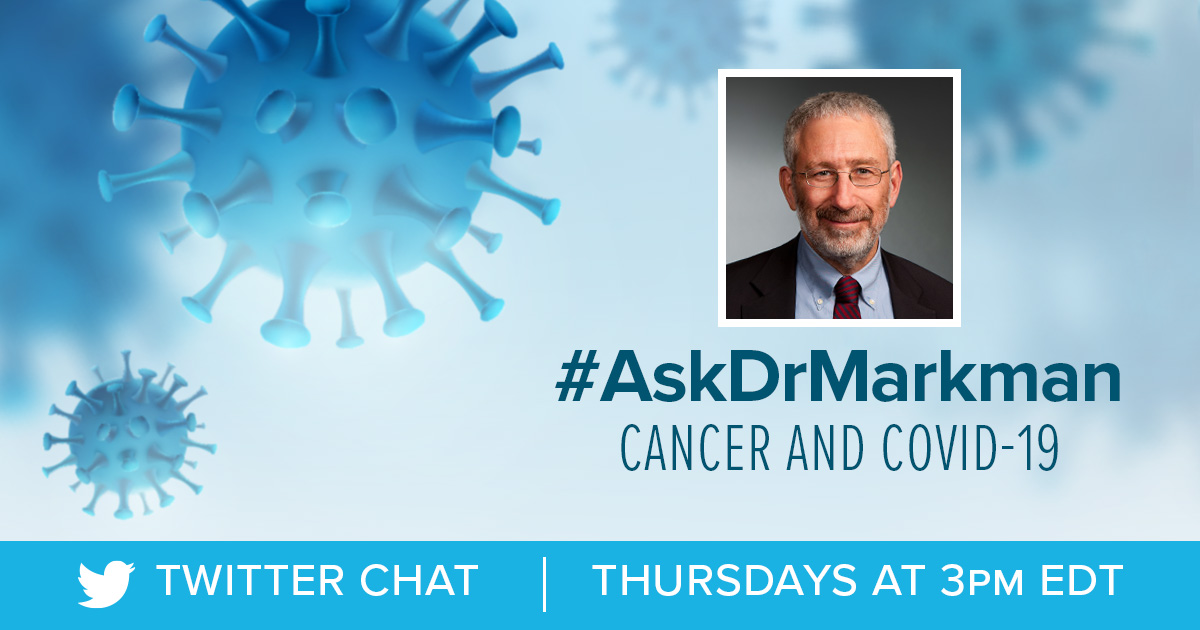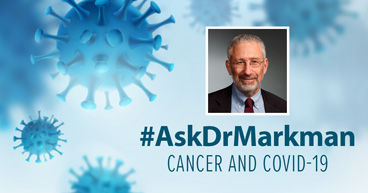
The COVID-19 pandemic has created a constantly evolving flow of new and sometimes confusing information. Cancer patients have many questions about how the virus may affect them, their access to ongoing treatments, their overall health and steps they can take to help reduce risk of infection. Maurie Markman, MD, President of Medicine & Science at Cancer Treatment Centers of America® (CTCA), has launched a weekly Q&A hosted on Twitter to answer your questions, in real time and as questions are sent to us online and by phone. Follow us at #AskDrMarkman. Here’s this week’s chat:
Question: As a cancer survivor, I’ve made it my business to be informed about COVID-19. I’ve been shocked at some rather outlandish claims for how this pandemic began. Do people actually believe these conspiracy theories?
Answer: It’s critical for all adults to know where to find reliable, truthful and up-to-date information regarding COVID-19, specifically that being provided by local, regional and national public health authorities. Unfortunately, there are many profoundly misleading and false claims being made by individuals and groups who spread misinformation through a variety of social media channels. A recent survey found that 24 percent believed COIVD-19 was at least slightly or moderately likely to have been developed as a bioweapon by a government or terrorist organization. There is simply no reliable evidence to support such a claim.
Q: My sister is receiving chemotherapy for breast cancer, and she’s very concerned about getting COVID-19. Are adults with risk factors, like my sister, concerned about their risk, and do they know what to do to reduce their risk of infection?
A: It is understandable that your sister is concerned about getting infected with COVID-19, as patients undergoing active cancer care are at a heightened risk for experiencing more serious consequences. To answer your question, a recent survey of 630 adults with chronic medical conditions who were in the care of several internal medicine practices were asked about their concerns and their knowledge of ways to prevent a COVID-19 infection. Twenty-five percent reported they were concerned, while another 25 percent felt they were not likely to be infected. Unfortunately, almost one-third of those surveyed were unable to identify ways to prevent infection, such as masks, social distancing, hand washing.
Q: I’m a 20-year prostate cancer survivor with a chronic heart condition, so I know I have a greater risk if infected with COVID-19. Do you know how much of the U.S. population has a greater than normal risk?
A: This is an important question, because experts have identified a number of risks factors linked to a serious COVID-19 infection, including heart disease, diabetes, chronic kidney disease, COPD and obesity. In a recent report examining 3,100 U.S. counties, the U.S. Centers for Disease Control and Prevention (CDC) found that 47 percent of the adult population had at least one potential risk factor for a more serious infection.
Q: My husband was recently treated for cancer, and I am recovering at home from a mild case of COVID-19. How long do I need to stay away from others to avoid infecting them?
A: I am unable to provide specific medical recommendations, so I suggest you speak with your physician about your questions. You should know, though, that the CDC has recently revised its recommendations regarding self-quarantine. These recommendations (not rules, but rather guidelines) suggest an individual can resume normal activities after 10 days if there is no fever or other symptoms of a COVID-19 infection. A negative COVID-19 test result is not required.
Q: My sister is a cervical cancer patient who lives in England, and she was told her scheduled surgery had to be delayed. Do you know anything about the delays in cancer care in the United Kingdom?
A: I can’t offer an opinion about the care or treatment delay specific to your sister. But reports have noted the United Kingdom, like the United States, is confronting considerable delays in cancer treatment. The charity Cancer Research UK noted 2.4 million people were waiting for cancer tests or treatment in June 2020, and more than 1 million patients had to wait more than 18 weeks for treatment.
Q: As we learn more about COVID-19, is the spectrum of severity becoming clearer? I ask this because my father has recently finished treatment for kidney cancer, and I’m concerned about him getting infected.
A: Yes, we are learning more about COIVD-19 through widespread testing and patient care, allowing for increasingly reliable estimates of the risk of having a mild versus a serious illness. Dr. Anthony Fauci recently noted that about 20-45 percent of COVID-19 patients have no symptoms. If symptoms do develop, about 80 percent are mild to moderate and 14 percent are severe, while 5 percent require critical care.
Q: As a cancer survivor, I am very eager to get the COVID-19 vaccine when it becomes available. But I have friends who say they won’t get it. Do we know how many will get vaccinated?
A: What can only be described as remarkably impressive international efforts are underway to develop one or more safe, effective COVID-19 vaccines before the end of 2020 or early 2021. In a recent survey of U.S. adults, 82 percent said they would get a U.S.-made vaccine. Interestingly enough, a separate survey found that more than 60 percent said any COVID-19 vaccine should be fully tested to document its safety and efficacy, even if the process delays its availability.
Q: Like all parents, I hope my children can return to school this fall, but I’m also worried about the risk to them and the rest of our family, especially my mom, who’s a cancer patient. Did closing schools this spring help reduce the spread of COVID-19?
A: Many of us share both your hopes and your legitimate concerns. In fact, yes, there’s striking evidence that school closures had a significant impact on the pandemic. One recent peer-reviewed report suggested that over a 28-day period, this national effort may have prevented as many as 1.37 million cases, while as many as 40,600 deaths may have been avoided over a 16-day period.
Q: I am doing my best to convince many of my friends about the value of wearing masks to prevent COVID-19 spread, but some refuse to listen. How can I convince them to take this critically important safety measure?
A: I appreciate your efforts, and your frustration. I suggest you inform your friends of a case study conducted by the CDC that strongly demonstrates the value of wearing a mask to prevent the spread of this dangerous virus: A Missouri hair stylist developed respiratory symptoms but continued to work closely with clients for eight days before being diagnosed with COVID-19. A second stylist who was exposed to this co-worker also developed symptoms, but she, too, continued to work for several days before testing positive. Between the two stylists, 139 clients were exposed. And yet, none developed symptoms, and 67 clients tested for COVID-19 tested negative. The salon, it turns out, had a universal masking policy, and the two infected stylists wore face masks while working with clients. There is an important message here.
Q: I want to do everything I can to keep my home safe from COVID-19, but I’ve had a hard time finding products. A friend suggested using a hand sanitizer that contains methanol. Is this safe?
A: NO! In fact, the U.S. Food and Drug Administration (FDA) has recently undertaken a major effort to require several companies to completely remove from the market any hand sanitizers that contain methanol. This is a very toxic compound and should absolutely not be used. There are widely available products that are safe and recommended for effectively cleaning surfaces of possible viral contamination in your home. In fact, the Environmental Protection Agency (FDA) has compiled this list.
Get tips on sanitizing your home from someone who cleans cancer hospitals.



